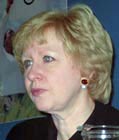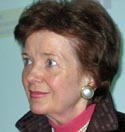Madrid Bombing Anniversary Marked by Democracy, Terrorism and Security Summit
Kim Campbell (Former Prime Minister of Canada and Secretary-General of the Club of Madrid), Mary Robinson (Former President of the Republic of Ireland, former UN High Commissioner for Human Rights and Vice President of the Club of Madrid) and J. Sean Curtin (Fellow, GLOCOM and Asia Times)
Friday 11 March 2005 marks exactly one year since the horrific bombings at Atocha station in Madrid in which nearly 200 were killed and over 1,500 people injured. The atrocity was carried out by an al-Qaeda affiliate and is considered to be Europe's 9/11. The "Club of Madrid," a dynamic and highly influential democracy promotion organization made up of 55 former heads of state and government, is holding a conference on the anniversary. The "International Summit on Democracy, Terrorism and Security" (8-11 March, 2005 in Madrid) will address the complex range of interrelated human rights, democratic rights and security issues that have emerged as a result of the 9/11, Madrid Bombing and other terrorist outrages. The event will gather former and current Heads of State and Government, decision and policy makers, the world's leading experts on democracy, terrorism and security, and citizens from around the world. UN Secretary-General Kofi Annan will give a keynote speech to the conference. The 11 March anniversary will be remember across Europe and in Spain it is designated as a day of national mourning.
 Kim Campbell: One part of what the Club of Madrid is looking at is how democracies can build on their particular qualities and capacities in order to create trust to increase security. The other side of the coin is how we can create policies that make our people secure without eroding democratic principles themselves. That is really the thrust of this Madrid conference and our focus is on practicalities. The Madrid agenda will have principles but also practical recommendations that we hope policymakers will embrace. Kim Campbell: One part of what the Club of Madrid is looking at is how democracies can build on their particular qualities and capacities in order to create trust to increase security. The other side of the coin is how we can create policies that make our people secure without eroding democratic principles themselves. That is really the thrust of this Madrid conference and our focus is on practicalities. The Madrid agenda will have principles but also practical recommendations that we hope policymakers will embrace.
The Madrid conference is committed to democracy. We believe that democracy is intrinsically the best form of government. It provides the best opportunity for the realization of human potential and human dignity. Therefore, our commitment is to try to make democracy possible in as many parts of the world as is achievable. This means real democracies, democracies that deliver not empty democracies.
The members of the Club of Madrid are individually all very political people because we are all former political leaders, but the organization itself has no ideology, only a commitment to democracy.
Sean Curtin: What is your opinion about the misuse of the label terrorist in a non-democratic state? In a democracy like Canada or Ireland, one can hear various definitions and opinions about exactly what democracy, terrorism and security mean. We can debate them and then hopefully come to some kind of consensus. Expanding the process with other democratic countries we can form an international consensus about the definitions of these terms. This is presumable what will happen at the forthcoming Club of Madrid conference.
However, since the terrible attacks of September 11, the problem is that in various parts of the world such as Central Asia and other parts of Asia, certain regimes have been applying the term terrorist to people and groups that are in no way involved in terrorism. So, do you feel that this exploitation of the term is somehow blurring the work that the Club of Madrid is trying to do? I presume that the Madrid conference will adopt measures and protocols to deal with this issue?
 Mary Robinson: Yes, I feel this is something that needs to be addressed and it touches on issues surrounding somewhere like Chechnya and yes, it is an issue that has got very blurred. I was very conscious because I was getting lots of information from human rights defenders on the ground and from experts about this branding as terrorist acts things that would not have been called terrorism before but it would have been called struggles by minorities within countries or something very different. Mary Robinson: Yes, I feel this is something that needs to be addressed and it touches on issues surrounding somewhere like Chechnya and yes, it is an issue that has got very blurred. I was very conscious because I was getting lots of information from human rights defenders on the ground and from experts about this branding as terrorist acts things that would not have been called terrorism before but it would have been called struggles by minorities within countries or something very different.
Sean Curtin: I wasn't actually thinking of any kind of act involving force or violence, but I was envisaging something like just protesting against a government and the protesters being labeled as terrorists.
Mary Robinson: Protesters, yes, that's overreach. It is really very worrying, so I hope it is something that the Madrid conference will really addressed and having addressed it will clarify the use of the terminology and then will reassure those who have really suffered terribly for the last couple of the years. Also, there is a real sense that issues of human rights concerns are not being raised in certain countries, if those countries have signed up to the war on terrorism. This is another aspect. If they are in the anti-terror camp, then they can within their own domestic sphere carry out acts that are actually very terrorizing to some parts of their population.
Club of Madrid Background
The Club of Madrid was launched following the Conference on Democratic Transition and Consolidation (CDTC), held in Madrid in October 2001. At that unprecedented gathering, 35 heads of state and government from Europe, the Americas, Asia and Africa met with more than 100 of the world's most respected scholars and policy experts to discuss the problems of building democracy from both a theoretical and practical point of view. The CDTC looked at eight core issues, including constitutional design, the legislature and its relations with the executive, the judiciary and its relations with the executive, anti-corruption measures, the role of armed forces and security forces, reform of the state bureaucracy, strengthening of political and social pluralism and of political parties, and economic and social conditions. In four days of intensive discussion between the leaders and experts, the two groups were able to identify areas of agreement and disagreement, and formulate practical recommendations for strengthening democracy around the world.
For more information see Club of Madrid
The above comments were made at Chatham House (Royal Institute for International Affairs) in London on 22 February 2005.
| 




